
The EU has revised the carbon regulations for its aviation sector to address climate change, which involves changes in how airlines secure permits.
The Council and the European Parliament signed a provisional political agreement in this regard.

Discover B2B Marketing That Performs
Combine business intelligence and editorial excellence to reach engaged professionals across 36 leading media platforms.
Amendment to the EU emissions trading system (EU ETS) for aviation ensures that the industry plays its part in the EU’s emission reduction goals under the Paris Agreement.
Air carriers operating within Europe are already required to submit permits from the EU’s carbon market to cover their carbon dioxide emissions.
However, most of these permits have been issued at zero charges until now.
The revised regulation lowers the number of these free allowances by 25% in 2024 and 50% in 2025, eventually removing them by 2026.

US Tariffs are shifting - will you react or anticipate?
Don’t let policy changes catch you off guard. Stay proactive with real-time data and expert analysis.
By GlobalData“This means allowances will be fully auctioned from 2026. As regards the use of revenues, co-legislators agreed to transfer 5 million of allowances from the aviation sector to the innovation fund,” the Council said.
Between 2024 and 2030, airlines will receive 20 million free CO2 permits to compensate them for the price difference between sustainable aviation fuel (SAF) and the cheaper kerosene-based fuel option.
Air carriers must also report nitrogen oxides and soot particles from 2025.
The EU intends to include these emissions in its carbon regulations in 2028.
The plan to amend the ETS rules for aviation forms part of the ‘Fit for 55’ package, which looks to help the EU lower its net greenhouse gas emissions by at least 55% by 2030 versus 1990 levels and reach climate neutrality in 2050.
Expressing its disappointment at the decision, industry group Airlines for Europe stated: “We must not forget that airlines have been paying for their emissions through the EU ETS since 2012. The cost of compliance for the ETS is likely to have increased five times in size by 2025 to over EUR 5 billion annually.
“A4E is extremely disappointed about the decision to phase out free ETS allowances currently granted to airlines by 2026. This is well before truly effective decarbonisation solutions will be available at the scale needed for them to be effective.”





